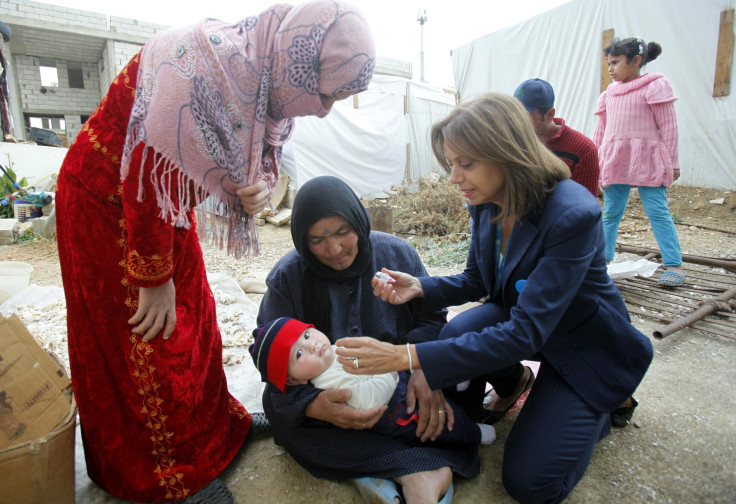Syrian Polio Originated In Pakistan And Is Now Spreading Across Middle East, WHO Says

Syria's polio outbreak has been genetically linked to the strain circulating in Pakistan and is also related to the wild poliovirus appearing in Egypt and Israel, the World Health Organization announced on Monday. The agency also reported an increase in the total number of laboratory-confirmed cases in Syria, which jumped from 10 to 13 cases. Wild poliovirus type 1 (WPV1), a highly infectious strain that causes paralysis, has not been detected in Syria since 1999.
“This is testimony to how small the world is and how we have to think of public health globally,” David Katz, MD, Yale School of Public Health, told Medical Daily.
International Spread
“The risk of further international spread of wild poliovirus type 1 across the region is considered to be high,” the United Nations agency stated in a press release. A surveillance alert has been issued to actively search for additional potential cases in the region. Due to a quick response on the part of health officials, children in Egypt, Israel, or the Palestinian territories have not been infected with the polio virus, Sona Bari, a spokeswoman for WHO, told Reuters. WHO first reported 22 cases of acute flaccid paralysis, a symptom of polio, in Deir al-Zor, which is home to 212,000 people, during mid-October. But with only 13 cases confirmed, the agency continues to investigate the remainder.
Last week, German scientists warned that an epidemic could ignite throughout Europe — which has been polio-free since 2011 — as the virus might be reintroduced by Syrians seeking refuge there. The WHO has been warning of mounting cases of communicable diseases both inside Syria and among displaced Syrians since June. For instance, measles had all but been eradicated in the war-torn country; nationally, a full 95 percent of the country’s population was vaccinated in 2010. But in only three years, that number has dropped to an estimated 45 percent resulting in 139 new cases of measles reported during the first quarter of this year alone.
In today's announcement, WHO indicated a large-scale outbreak response had been launched in Syria on October 24 to vaccinate 1.6 million children against polio, measles, mumps, and rubella. Accessibility and security are difficult in Deir al-Zor, which is mainly held by Syrian government forces. In the countryside around the city, however, rebels fighting to remove President Bashar al-Assad have taken control. A larger-scale response on the part of public health workers has already begun in other regions of Syria and neighboring countries, and are expected to continue for the next six to eight months.
Worldwide Effort
Just 25 years ago, polio was endemic in 125 countries and nearly 350,000 people, mainly children under the age of 5, were becoming paralyzed each year due to polio. In 1988, the World Health Assembly established the goal of eradicating polio, and since then, the number of polio cases have been reduced by more than 99 percent, with the number of endemic countries dwindling to just three.
As of Nov. 6, public health officials have reported 328 total cases of polio worldwide, easily surpassing the 181 cases confirmed at this same date last year. New cases of polio are appearing in Pakistan, particularly in its northwestern territory where, during June 2012, the Taliban denounced vaccines as a Western plot to sterilize Muslims. At that time, leaflets accused health workers who administer anti-polio drops of being U.S. spies, according to The Guardian. War and political strife, then, have clearly threatened efforts to eradicate the disease for some time now.
Published by Medicaldaily.com



























